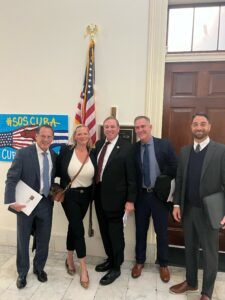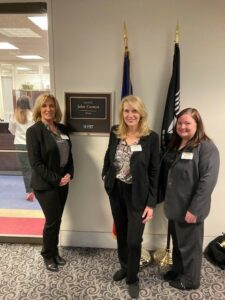
Archive for Uncategorized
Omnibus Bill Partially Addresses Medicare Payment Cuts
After Congress passed a one-week continuing resolution (CR) to avoid a government shutdown, legislators released the text of the long-awaited Omnibus in the early hours of Tuesday morning. The 4,155-page legislation must be enacted by Friday December 23rd to avoid a government shutdown.
With regard to Medicare payment, the legislation fully averts the 4% PAYGO sequestration in 2023 and 2024. As to the Medicare Physician Fee Schedule conversion factor, however, the bill provides only 2.5% worth of relief for the almost 4.5% cut scheduled for 2023, leaving providers with an approximately 2% reduction to absorb next year. For 2024, the bill provides only 1.25% worth of relief. Given that the 2024 conversion factor is unknown as of yet, the real-world impact of that 1.25% is more speculative at this time, but it is expected under this provision that physicians will again suffer an additional payment cut in 2024, relative to both 2023 and 2022.
In the final weeks leading up to release of the Omnibus, lawmakers on both sides of the aisle pressured leadership to ensure that the 4.5% conversion factor reduction was averted in full. A bipartisan letter signed by 115 legislators led by Rep. Wild (D-Pa.) and Rep. Miller-Meeks (R-Iowa) requested that both the PAYGO and conversion factor cuts be stopped entirely, noting that these two reductions would be piled onto the 2% Medicare sequestration cut, which resumed on July 1st of this year. Furthermore, the letter stated opposition “to paying for preventing these cuts with additional provider cuts.” The House GOP Doctors Caucus weighed in with another letter to leadership, requesting a solution to the impending Medicare payment cuts. On the Senate side, Sen. Kennedy (R-La.) introduced legislation to avert the full 8.5% cut to Medicare in 2023, but that legislation was objected to by Finance Committee Chairman Wyden (D-Ore.), because the Kennedy bill bypassed the Committee process and because addressing the physician cuts via standalone legislation may jeopardize inclusion of other priorities in the larger year-end legislation.
The Omnibus does contain a two-year extension of pandemic-related Medicare telehealth flexibilities, as well as an extension of a provision allowing coverage of telehealth services in high deductible health plans with Health Savings Accounts. The legislation would also extend separate COVID-related waivers that allow for the treatment of some emergency department patients and inpatients from their home. The legislation also extends (at 3.5%) an expiring 5% bonus for providers participating in alternative payment models.
Physician groups expressed disappointment that Congress would allow any level of reimbursement reduction to go into effect at a time when providers are facing record inflation and staffing shortages, particularly since the legislation extends the 2% Medicare sequester on providers by another year in 2032, to help pay for other priorities in the bill. Overall, the Omnibus contains over $1.6 trillion dollars of spending. The bill is expected to pass by Friday’s deadline without major changes, but EDPMA will closely monitor all amendments and alert members to any relevant changes, if needed.
Looking ahead, EDPMA will aggressively pressure legislators for permanent reform to Medicare payment, since these annual last-minute crises cause instability in the Fee Schedule that affects beneficiary access to care.
Updates Released on No Surprises Act Federal IDR Process
As the Federal agencies tasked with implementing the No Surprises Act continue to work through the backlog of disputes that have been stuck in the IDR process with the contractors hired by the Federal government to administer dispute resolutions (referred to as certified independent dispute resolution entities or IDREs), several recent announcements have been made that are important for providers who are seeking to have disputes resolved under the Federal IDR process.
- IDRE Reselection Process: As has been the case since the initial implementation of the No Surprises Act, under the Federal IDR process, disputing parties must agree on an IDRE to administer the dispute resolution, and where the parties cannot agree, the regulations allow for the federal agencies to randomly assign the IDRE. Until recently, this “back-and-forth” of selecting an IDRE has been primarily conducted via email communications. Beginning on December 12th, the U.S. Department of Health and Human Services (HHS) launched a new web functionality intended to streamline this process during the “initiation of IDR” phase. The new form is referred to as the “IDR Entity Reselection Response Form.” HHS has released an instructional video for disputing parties to familiarize themselves with the new process.
- New Requirement for Parties Challenging IDR Initiation to Provide Documentation: The Centers for Medicare and Medicaid Services (CMS) made a positive announcement that, beginning the week of December 19th, parties that are challenging IDR initiation must now provide documentation in support of their challenge rather than just making unsubstantiated accusations that can slow down the IDR process. As described in the CMS announcement, instances that will now require documentation from health plans when making a challenge to Federal IDR initiation include:
- “Specified State Law or All-Payer Model Agreement”: If an entity attests that a dispute is eligible for a state process to determine the out-of-network rate, the entity must provide: specific citation(s) for the state law or regulation that constitutes a specified state law or all-payer model agreement that applies to the items or services in the dispute; and documentation that confirms that the state law applies, including proof of the health plan type.
- “Open Negotiation Not Completed”: If an entity attests that the open negotiation period was not completed for a dispute, the entity must provide: the date when the open negotiation period will be completed; and documentation that confirms the open negotiation start date.
- “Late IDR Initiation”: If an entity attests that more than four business days have elapsed since the open negotiation period ended, the entity must provide: the date that was the last day in the four business day period after the open negotiation period; and documentation that confirms when the open negotiation period was initiated for the claim or claims subject to the dispute.
- “Not Covered by NSA”:
- If an entity attests that a dispute includes items or services not covered under the No Surprises Act, the entity must provide a list of which items and services included in the dispute were not covered under the No Surprises Act and, for each item or service listed, an explanation as to why it is not covered under the No Surprises Act.
- If an entity attests that a dispute includes items or services that are covered by a coverage type not subject to the No Surprises Act, the entity must provide a list of items or services covered by the coverage type not subject to the No Surprises Act and the coverage type that applies to them.
- If an entity attests that the coverage year for an item or service in a dispute started prior to the No Surprises Act implementation date of January 1, 2022, the entity must provide: the plan or policy year associated with the dispute; and documentation to confirm the date that the plan or policy year started.
- “Not Covered by Current Insurance Policy”: If an entity attests that the dispute includes items or services not covered by the patient’s insurance policy, the entity must provide: a list of items or services in the dispute that are not covered; and documentation that confirms these items or services are not covered by the patient’s insurance policy (such as a copy of the policy).
- “Improperly Batched or Bundled”: If an entity attests that a dispute includes items or services that were improperly batched or bundled, the entity must provide a list of the items or services that were improperly batched or bundled, and for each item or service on the list, indicate the batching or bundling requirement that was not met.
- “Cooling Off Period Not Completed”: If an entity attests that a 90-calendar-day cooling off period applies to the dispute and has not been completed, the entity must provide: the dispute number for the payment determination that initiated the 90-calendar-day cooling off period; and a copy of the payment determination that initiated the 90-calendar-day cooling off period.
EDPMA Virtual Workshop: Facing Reimbursement Headwinds: Planning for Profitable Growth in 2023 and Beyond
With strong headwinds facing the traditional success model for EM, new strategies must be pursued to grow and remain profitable. During this workshop you will learn from successful EM group leaders how they plan for and move towards a business model less reliant on fee for service brick & mortar EM revenue. We will also review the costs & key performance indicators you’ll need to monitor as you evolve your business. Last, we will explore how relationships with staff, hospital administration, payers, and your community enable you to successfully evolve.
Learning Objectives
- Participants will learn how to plan for growth through an Enterprise Risk Framework that enables data driven strategic decision that balances opportunity with risk.
- Participants will learn about various growth opportunities and get tips on how to prioritize and pursue them
- Participants will learn about the best opportunities, methods and data needed to pursue quality Pay for Performance programs that are not only good medicine but also pay off
- Participants will learn about how to pursue, develop and maintain relationships to enable the agility needed for change and growth.
NSA Update: CCIIO Issues New Guidance and Platform Updates for IDR Initiation
The Center for Consumer Information and Insurance Oversight (CCIIO) released new guidance in November related to several stages of the No Surprises Act’s (NSA’s) Federal Independent Dispute Resolution (IDR) process.
- CCIIO announced that beginning the week of November 28th:
. . . a party seeking to initiate a payment dispute through the federal Independent Dispute Resolution (IDR) portal will be required to include certain documentation with the notice of initiation submission. Specifically, any party initiating a payment dispute must now upload the following:
-
- Documents to confirm the open negotiation period start date (for example, the notice of open negotiation).
- Documents to confirm the claim and Qualifying Payment Amount information (i.e., the notices associated with the initial payment or notice of denial of payment).
Additionally, any party that enters an open negotiation start date more than 34 business days earlier than the date on which the form was completed must now upload documents to confirm that the claim is still eligible for the IDR process. The initiating party must upload at least one of the following:
-
- Documents to confirm the extension approval received from the federal IDR mailbox.
- Documents to confirm the certified IDR entity’s request to re-submit the dispute due to batching or bundling errors.
- Documents to confirm the 90-day cooling off period has expired.
An entity that does not upload the required documentation will not be able to submit the notice of IDR initiation.
EDPMA has confirmed that this requirement to upload documentation related to the QPA does not preclude providers from initiating IDR in instances where the health plan has failed to make the required disclosures. In those cases, disputing parties should include the remittance advice or other documentation where you believe the QPA should have been disclosed had the health plan met its disclosure obligations. For departmental guidance on this topic, consult the August 2022 FAQs which state:
Q20: If a plan or issuer has failed to disclose the information it is required to provide when making an initial payment or sending a notice of denial of payment, may a provider, facility, or provider of air ambulance services initiate an open negotiation period and then proceed to the Federal IDR process?
Yes. In general, providers, facilities, and providers of air ambulance services have 30 business days from the day they receive an initial payment or a notice of denial of payment from the plan or issuer regarding an item or service to initiate open negotiation with respect to that item or service, including in cases in which information required to be provided is missing. However, a plan’s or issuer’s failure to satisfy the disclosure requirements in 26 CFR 54.9816-6T(d)(1) or (2), 26 CFR 54.9816-6(d)(1), 29 CFR 2590.716-6(d)(1) or (2), and 45 CFR 149.140(d)(1) or (2) could adversely affect a provider’s, facility’s, or provider of air ambulance services’ ability to meaningfully participate in negotiations during the open negotiation period and Federal IDR process.
In these cases, when a plan or issuer fails to comply with the disclosure requirements in 26 CFR 54.9816-6T(d)(1) or (2), 26 CFR 54.9816-6(d)(1), 29 CFR 2590.716-6(d)(1) or (2), and 45 CFR 149.140(d)(1) or (2), providers, facilities, or providers of air ambulance services retain the right to initiate the open negotiation period within 30 business days of receiving the initial payment or notice of denial of payment. In initiating the open negotiation period, the provider, facility, or provider of air ambulance services, must provide the standard open negotiation notice to the plan or issuer, as required in 26 CFR 54.9816-8T(b), 29 CFR 2590.716-8(b), and 45 CFR 149.140(b). After the 30-business-day open negotiation period has lapsed, the provider, facility, or provider of air ambulance services may initiate the Federal IDR process in accordance with the normal timelines.
Alternatively, in cases in which a plan or issuer fails to comply with the disclosure requirements in 26 CFR 54.9816-6T(d)(1) or (2), 26 CFR 54.9816-6(d)(1), 29 CFR 2590.716-6(d)(1) or (2), and 45 CFR 149.140(d)(1) or (2), providers, facilities, or providers of air ambulance services may request an extension to initiate the Federal IDR process, and provide applicable attestations, by emailing a request for extension due to extenuating circumstances to FederalIDRQuestions@cms.hhs.gov, including the time period(s) for which they are seeking an extension.
Failure by either party to supply information that is required to be submitted to the certified IDR entity (for example, failure to provide the QPA) may lead to a finding by the certified IDR entity that does not take into consideration the absent information, or may lead to the certified IDR entity drawing an inference about the absent information that is adverse to that party. Providers, facilities, and providers of air ambulance services with concerns about a plan’s or issuer’s compliance with the requirements of 26 CFR 54.9816-6T(d)(1), 26 CFR 54.9816- 6(d)(1), 29 CFR 2590.716-6(d)(1), and 45 CFR 149.140(d)(1), including concerns that a plan or issuer is not acting in good faith with respect to this requirement, may contact the No Surprises Help Desk at 1-800-985-3059 or submit a complaint at https://www.cms.gov/nosurprises/policies-and-resources/providers-submit-a-billing-complaint. The Departments will generally enforce the applicable provisions of the No Surprises Act, in conjunction with states where applicable. (Footnotes omitted).
- CCIIO released an updated document, Independent Dispute Resolution (IDR) Notice of Initiation Web Form, which can be accessed here, with the following highlighted changes:
- Requiring all initiating parties to submit the health plan type associated with the dispute. The plan should have provided this information when they submitted the initial payment or notice of denial of payment or during open negotiation. If the plan fails to provide this information to the provider, the provider may choose the No Plan/Issuer Response option.
- Requiring an initiating party that is a provider, facility, or a provider of air ambulance services to provide a Tax I.D. number or National Provider Identifier (NPI) number.
- Adding the ability for initiating parties to include mailing address and other contact information for additional points of contact.
EDPMA continues its close work with ACEP on implementation and advocacy related to the No Surprises Act and will continue to provide additional updates and information.
CMS Finalizes Rural Emergency Hospital (REH) Rules For January 1st Implementation
On November 1st, the Centers for Medicare and Medicaid Services (CMS) released the calendar year (CY) 2023 Hospital Outpatient Prospective Payment System final rule. This rule also finalized policies for the new Medicare enrollment designation of Rural Emergency Hospitals (REHs), which were authorized under law to be eligible for Medicare payments beginning on January 1, 2023. Here are the key takeaways from the finalized provisions related to REHs:
- CMS Finalized Provisions from 2 Separate Proposed Rules: The proposed rules for REHs were released in two parts: (1) a standalone proposed rule to set the Conditions of Participation (CoPs) for REHs; and (2) in the CY 2023 OPPS proposed rule where CMS laid out its proposed policies for payment, enrollment, and quality reporting. In this OPPS final rule, CMS finalized provisions for both the CoPs as well as the proposals from the OPPS proposed rule.
- CMS Replied to EDPMA Request For Clarification on Closed CAHs/Rural Hospitals That Would Otherwise Be Eligible to Enroll as an REH. One of the statutory criteria for a facility to be eligible to convert to an REH sets out that the facility must have been a critical access hospital (CAH) or a rural hospital with not more than 50 beds as of December 27, 2020. EDPMA sought clarification about CAH/rural hospitals in existence as of December 27, 2020 but that subsequently closed. In response to our requests, CMS clarified that “facilities that were CAHs or rural hospitals with not more than 50 beds as of the date of enactment of the CAA and then subsequently closed after that date, would be eligible to seek REH designation after the closure of the facility.”
- CMS Encourages Presence of Emergency-Trained Personnel. As part of the final CoPs related to staffing and emergency services. CMS continued to state that it wanted to proceed cautiously given workforce concerns and provide REHs with the flexibility to staff the facility as appropriate for that facility’s setting. However, in response to requests for requirements that there be some emergency medicine expertise, CMS will require that “the REH be staffed at all times by an individual who is competent in the skills needed to address emergency medical care. The individual must be able to receive patients and activate the appropriate medical resources to meet the care needed by the patient.” CMS also states that it will require that the “individual has the ability to effectively communicate information regarding the condition of patients presenting to the emergency department for treatment to the physician or other practitioner notified of the patient’s arrival.” In addition, under the final CoP requiring a Quality Assessment & Performance Improvement Program (QAPI) Program, CMS also added that an REH must “specifically measure, analyze, and track staffing as a quality indicator.”
- CMS Reverses Course on creation of new REH Stark Exception. CMS did not finalize the creation of a new specific “REH Exception” to the physician-self referral prohibition, which would have allowed physician ownership and investment in REHs, due to stakeholder concerns. CMS reminds stakeholders, however, that for REHs located in rural areas, the “Rural Provider Exception” is available.
- CMS Lays Out REH Quality Reporting Program Framework But No Immediate Reporting Requirements Finalized. With regard to the REH Quality Reporting Program (REHQR), CMS sought feedback on potential measures and criteria for measure selection that it could adopt in the future. While CMS discusses some of this feedback, it did not finalize the use of any specific measures, which means that quality reporting will almost certainly not begin in 2023. However, CMS did finalize that for REHs to participate in the REHQR Program, they must 1) have an account for the purpose of submitting data to the Hospital Quality Reporting (HQR) system and 2) designate a Security Official (SO).
CMS Releases 2023 Medicare Physician Fee Schedule Rates & Policies
On November 1st, the Centers for Medicare and Medicaid Services (CMS) released the calendar year (CY) 2023 Medicare Physician Fee Schedule (MPFS) final rule. The rule finalizes changes to the MPFS and other Medicare Part B payment policies, along with changes to the Quality Payment Program (QPP).
Here are the big takeaways for emergency medicine from the final rule:
- CMS Finalizes Cut to the 2023 Conversion Factor Teeing Up End of Year Congressional Action. CMS set the final CY 2023 MPFS conversion factor is set at $33.0607, which is down approximately 4.47 percent, or $1.55, from CY 2022. While CMS estimates that emergency medicine will have no overall financial impact form the finalized policies, this does not account for the evaporating 3% conversion factor remedy Congress provided in 2022. Without additional action by Congress, that payment cut will go into effect for 2023. See EDPMA’s action alert to contact your members of Congress.
- CMS Maintains Level 4 ED Visit Value, Departing from AMA RUC Recommendation. CMS generally accepted the CPT and RUC revisions for the following E/M code sets: ED visits, inpatient and observation services; discharge management; nursing facility visits; home and residence visits; and cognitive assessment and care planning services. This included accepting the RUC recommended values for those codes with one exception: CMS finalized its proposal to depart from the RUC recommendation for ED level 4 to preserve the current RVUs of 2.74 rather than reducing it to 2.60 as the RUC had recommended. As part of this package of policies, CMS also finalized adoption of the revised CPT documentation guidelines for emergency department (ED) evaluation and management (E/M) visits. (For more information on the ED E/M documentation guideline changes coming January 1, 2023, see information from AMA CPT via this link.)
- CMS Speaks to Concerns about “8 to 24 Hour Rule.” CMS made clarifications from what it had stated in the proposed rule. While CMS states that the final policy is meant to reflect what is already in the Medicare Claims Processing Manual, CMS admitted it made mistakes in articulating its intended policy in the proposed rule and seeks to clarify these in the final rule. CMS clarified and finalized that the general principles are as follows:
- When a patient receives inpatient or observation care for less than 8 hours, only the “initial” service shall be reported by the practitioner for the date of admission; no discharge day management code shall be reported
- When a patient is admitted for inpatient/observation and then is discharged on a different calendar date, the practitioner shall report the “initial service” and the appropriate discharge day management code
- When a patient receives inpatient or observation care for at least 8 hours and is discharged on the same calendar date, the practitioner should bill the appropriate “same day discharge” code
- CMS Delays Problematic “Time Only” Split (or Shared) E/M Visit Policy But 2024 Rulemaking Will Prove Crucial: As requested by EDPMA, CMS finalized its one year delay of its planned implementation of defining the “substantive portion” (and thus the billing practitioner) of a split/shared visit as “more than half of the total time.” This policy had been set to go into effect on January 1, 2023. Until January 1, 2024 or until CMS issues new rulemaking, substantive portion will continue to be defined as “one of the three key components (history, exam, or MDM)” of the E/M.
- CMS Finalized Continuation of Favorable Medicare Telehealth Services for Emergency Medicine But Advocacy Continues for Post-PHE Policies. CMS reiterated that it will issue program instruction or other subregulatory guidance to implement the extension of the telehealth flexibilities that the Consolidated Appropriations Act, 2022 provided for a period of 151 days after the end of the COVID-19 PHE. With the expected extension of the PHE well into 2023, these issues will need to be addressed later in the year.
- CMS Finalized the Statutorily-Required Category Weights for MIPS and Keeps Performance Threshold to Avoid a Penalty Steady. Per the Medicare and CHIP Reauthorization Act of 2015 (MACRA), the 2023 MIPS performance category weights are as follows: 30% quality; 30% cost; 15% improvement activities; 25% PI. The MIPS performance threshold, which is the minimum number of points needed to avoid a penalty in 2025 based on 2023 performance, will remain at 75 points. As a reminder, under statute, the exceptional performance bonus will no longer be available starting with the 2023 performance year.
- CMS Makes Facility-Based Clinicians Eligible for “Complex Patient Bonus.” Facility-based clinicians will be eligible for the complex patient bonus, even if they do not submit MIPS data.
- CMS Finalizes Emergency Medicine “MIPS Value Pathway.” The MIPS Value Pathways (MVP) titled, “Adopting Best Practices and Promoting Patient Safety within Emergency Medicine,” was finalized as proposed as an optional MIPS participation pathway starting in 2023. More information about the Emergency Medicine MVP can be downloaded here. General information about the MVP pathway, including scoring and registration requirements, can be found here.
- CMS Finalizes Changes to the MIPS Emergency Medicine Specialty Measure Set. Changes to the Emergency Medicine Specialty Set:
- Added #65: Appropriate Treatment for URI
- Added #134: Screening for Depression and Follow up Plan
- Added #226: Tobacco Use: Screening and Cessation Intervention
- Added #431: Unhealthy Alcohol Use: Screening and Brief Counseling
- Added new #487: Social Drivers of Health measure
- Removed Part B claims collection type for #416: ED Utilization of CT for Minor Blunt Health Trauma for Patients Aged 2 through 17 Years
- Questions Remain About 2023 COVID-19 Exception. CMS has not yet announced whether it will continue to offer the MIPS Extreme and Uncontrollable Circumstances (EUC) Exception due to COVID-19 in 2023.

David Schillinger, MD, FACEP
Shanna Howe
Rep. Neal Dunn (R-Fla.)
William Freudenthal, MD, FACEP
Charlie Schuyler

Charlie Schuyler
William Freudenthal, MD, FACEP
Rep. Larry Bucshon (R-Ind.)
Shanna Howe
David Schillinger, MD, FACEP




Press Release: EDPMA Files Amicus Brief Holding Federal Regulators Accountable To Implement the No Surprises Act As Required By Law
FOR IMMEDIATE RELEASE
EDPMA Files Amicus Brief Holding Federal Regulators Accountable To Implement the No Surprises Act As Required By Law
McLean, Virginia – The Emergency Department Practice Management Association (EDPMA) filed an amicus brief today in support of the Texas Medical Association (TMA), Dr. Adam Corley and Tyler Regional Hospital, LLC’s lawsuit against federal regulators challenging the implementation of the No Surprises Act (Rule) that clearly favors health plans.
Last fall, EDPMA, and the Virginia and Texas College of Emergency Physicians filed an amicus brief in support of TMA’s first lawsuit challenging federal regulators on the process to resolve reimbursement disputes between insurance plans and physicians, with special emphasis on the adverse effects the Rule threatens on the delivery of emergency care. The TMA plaintiffs won this lawsuit.
The court ruled that the NSA was not ambiguous and required that all the factors listed in the statute should be considered in determining the final payment amount. In the settled TMA case, the court clearly stated that the methodology used by health plans to calculate the QPA was incompatible with the No Surprises Act.
However, nothing really changed regarding how arbitrators resolved billing disputes between healthcare plans and physicians. In fact, arbitrators continue to unfairly skew independent dispute resolution (IDR) results in favor of insurers.
“EDPMA fully supports claims in the TMA lawsuit that simply ask that the No Surprises Act be followed as written so that the arbitrators charged with resolving payment disputes would not anchor the payment amount to the QPA and that their decision making is rooted in the statute. If the current final rule and de-facto benchmark standard goes unchecked, emergency medicine physicians, their practices and their value as our nation’s healthcare safety net are in jeopardy. Access to emergency care – which was vital to assisting our country through the pandemic – will be compromised with fewer resources to emergency care while the health plans then and now continue to post record profits,” says Don Powell, DO, FACEP, EDPMA Chair of the Board.
EDPMA will continue to advocate for emergency medicine physicians and their practices to ensure fair reimbursement to protect patients and their in-network choices.
About EDPMA:
EDPMA is the nation’s only professional physician trade association focused on the delivery of high quality, cost-effective care in the emergency department. EDPMA’s membership includes emergency medicine physician groups of all sizes, as well as billing, coding, and other professional support organizations that assist healthcare providers in our nation’s emergency departments. Together, EDPMA’s members deliver or directly support health care for approximately half of the 146 million patients that visit U.S. emergency departments each year.
Contact:
Cathey Wise
703.506.3282 (direct) l 817.905.3310 (cell)
cathey.wise@edpma.org
Filed 10/20/2022
EDPMA Submits Two Comment Letters Addressing New Rural Emergency Hospital (REH) Proposed Policies
The Centers for Medicare and Medicaid Services (CMS) recently issued two rulemaking vehicles to implement the new facility enrollment designation of Rural Emergency Hospitals (REHs) as created by Congress when it passed the Consolidated Appropriations Act, 2021. The statutory provision allows for the establishment of REHs by essentially allowing already-existing critical access hospitals (CAHs) and certain rural hospitals to convert to REHs. Eligible facilities will be able to enroll as REHs under statute for January 1, 2023 services. In preparation for the rules, EDPMA created a work group tasked with developing policies and requests for changes where needed. As a result of these efforts, EDPMA responded to both REH proposed rule comment solicitations:
- REH Conditions of Participation (CoPs): On August 25th, EDPMA responded to the CMS proposed rule related to the creation of CoPs for REHs. The proposals were largely based on already-existing CoPs for critical access hospitals and rural hospitals. EDPMA made several requests as part of its response:
- EDPMA urged CMS to provide an enrollment option for those CAHs or rural hospitals that otherwise meet the REH eligibility criteria but closed subsequent to December 27, 2020 to enroll as an REH.
- EDPMA emphasized the importance of clinical services delivered at an REH being led by a physician with, at the minimum, experience in the practice of emergency medicine, noting that the expertise of a board-certified emergency physician should be relied upon whenever medically necessary and available.
- EDPMA encouraged express guidance from CMS on the ability of emergency physicians who are performing the medical director and other supervisory responsibilities to meet these requirements remotely (provided all remote requirements are met).
- EDPMA recommended that CMS clarify its staffing requirements so that the expertise of a physician be available 24 hours a day/7 days a week.
- EDPMA urged CMS to work with Congress and state governments to address the complexities and variations in the abilities of physicians to provide telemedicine services across state lines.
- EDPMA recommended that CMS add provisions to the REH CoP that require the “written agreements” with Level 1 and Level 2 trauma centers and the “system . . . for referral from an REH to different levels of care” to include the capacity for telemedicine capabilities with a physician with, at the minimum, experience in the practice of emergency medicine.
You can review the full EDPMA response to the REH CoP proposed rule here.
- REH Enrollment, Payment, Quality Reporting, and Other Provisions: As part of the calendar year (CY) 2023 Hospital Outpatient Prospective Payment System (OPPS) proposed rule, CMS issued proposals related to several other policies for REHs for the January 1, 2023 effective date. EDPMA made several requests in response to these proposals:
- EDPMA reiterated its request that CMS provide an enrollment option for those CAHs or rural hospitals that otherwise meet the REH eligibility criteria but closed subsequent to December 27, 2020 to enroll as an REH.
- Statute sets payments for “REH Services” at 105% of the rate that would otherwise be paid in a hospital outpatient department. EDPMA recommended that CMS define “REH services” more broadly in order to implement these regulations more in line with Congressional intent and recommended that CMS modify its proposal so as to reimburse the professional (and not just the facility) claim for outpatient services at 105% of traditional fee-for-service payment.
- EDPMA recommended that CMS issue explicit guidance about the Medicare Physician Fee Schedule claims submission process for professional services delivered in the REH setting.
- EDPMA requested that CMS explicitly include CAH emergency physician availability costs as part of its methodology for calculating Monthly REH Facility Payments or, in the alternative, to administer this funding to REHs via a mechanism that will allow REHs to dedicate these resources to staffing their emergency departments.
- EDPMA supported CMS’ proposals to allow REH utilization of the “change of information” enrollment form and for REH placement in the “limited risk” screening category.
- EDPMA encouraged CMS to finalize its proposal that the Medicare Outpatient Observation Notice (MOON) will not be required for use in the REH setting.
- EDPMA supported CMS’ proposal to ensure that physician REH ownership and investment interests are specifically safeguarded through a new Stark exception.
- EDPMA expressed concern about the list of potential measures under consideration for the REH Quality Reporting (REHQR) program, which largely consists of current or past Hospital Outpatient Quality Reporting (OQR) Program measures and does not accurately reflect care in REH settings and recommended that CMS look beyond the OQR measures and instead work with clinical and patient stakeholders to develop a new, custom set of measures that better reflects the unique challenges associated with providing care in the REH setting.
The full EDPMA CY 2023 OPPS comment letter on these REH provisions is available here.
